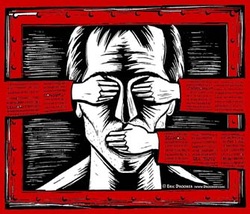
If journalists are self-censoring with the anticipation that writing about, or even talking about, certain subjects will land them in trouble, then our version of reality is tinted by rose-colored glasses. By not talking about the Middle East or Northern Africa, or military affairs, or certain languages (which ones?) these topics essentially cease to exist.
In many ways, self-censorship is worse than overt institutional censorship. There is nobody to challenge, and nobody to sue, because those who censor themselves have chosen not to exercise their Constitutional right to free speech
If you don't use it, you lose it.
__________________________________________
The Big Chill: Authors Avoid Controversial Topics in Wake of NSA Revelations, PEN Survey Says
Author's Guild, November 13, 2013
Fear of government intrusion is influencing how some American authors and journalists do their jobs, causing them to avoid researching, writing about and even privately discussing many of the most newsworthy topics, according to a report by the PEN American Center, Chilling Effects: NSA Surveillance Drives U.S. Writers to Self-Censor:
“Writers reported self-censoring on subjects including military affairs, the Middle East North Africa region, mass incarceration, drug policies, pornography, the Occupy movement, the study of certain languages, and criticism of the U.S. government. The fear of surveillance—and doubt over the way in which the government intends to use the data it gathers—has prompted PEN writers to change their behavior in numerous ways that curtail their freedom of expression and restrict the free flow of information."
The report, based on a survey of PEN members, measured how writers had changed their behavior because they thought the government was monitoring their communications. Among the findings:
• 16% have avoided writing or speaking on a particular topic, 11% have seriously considered it.
• 28% have curtailed or avoided social media activities, 12% have seriously considered it.
• 24% have avoided certain topics in phone or email conversations, 9% have seriously considered it.
• 16% have refrained from conducting Internet researches or visiting websites on topics that may be considered controversial or suspicious, 12% have seriously considered it.
• 13% have taken extra steps to disguise or cover their digital footprints, 11% have seriously considered it.
• 3% have declined opportunities to meet (in person or electronically) people who might be deemed security threats by the government, 4% have seriously considered it.
Conducted in October with the help of research firm FDR Group, the survey tracked the responses of 528 PEN members. Questions touched on the experiences, concerns and attitudes of writers in the wake of revelations about National Security Agency surveillance that began with documents leaked by Edward Snowden.
In follow-up conversations, some writers talked about dropping projects out of fear of becoming surveillance target. Others said they’re already a target:
“‘Selected’ for a special security search returning to the United States from Mexico twice last summer, I learned I was on a U.S. Government list. I was searched for ‘cocaine’ and explosives. I suspect … that I must have been put on the government list because of an essay I wrote … in which I describe finding a poem on a Libyan Jihad site, and ultimately express some sympathy for young men on the other side of the world who are tempted into jihad … one can see how [the poem] might be a comfort to jihadists.”
The survey found 85% are worried about government surveillance of Americans, while 73% say they’ve never been as concerned about privacy rights and freedom of the press as they are now.
Survey results showing a high level of concern about being compelled to reveal sources are especially timely as the Senate considers federal shield law legislation. PEN doesn’t mention the legislation by name, but it does call on on the government to enact limits on surveillance and improve transparency, reforms similar to those found in the Free Flow of Information Act.
One particularly intriguing aspect of the report is how it reveals writers to be much less tolerant of having their communications monitored than Americans overall. Asked their opinion of “the government’s collection of telephone and Internet data as part of anti-terrorism efforts,” only 12% of PEN members said they approve, compared with half of respondents in an earlier survey of the general public.
As the PEN report concludes, the cost of government surveillance is largely hidden.
“Part of what makes self-censorship so troubling is the impossibility of knowing precisely what is lost to society because of it. We will never know what books or articles may have been written that would have shaped the world’s thinking on a particular topic if that are not written because potential authors are afraid that their work would invite retribution.
 RSS Feed
RSS Feed